#asian diaspora
Text
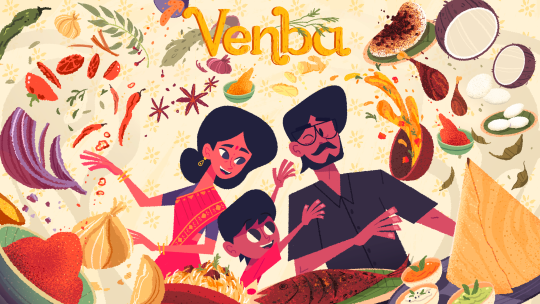




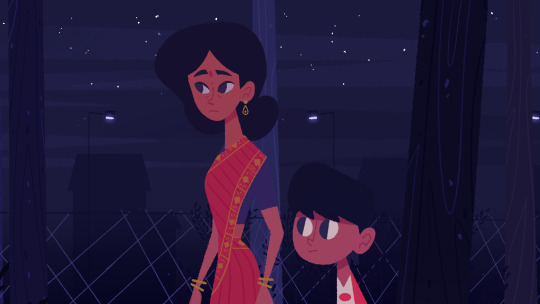
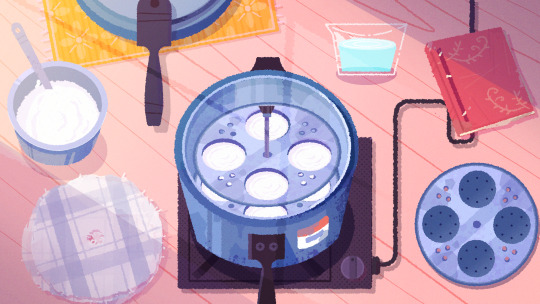
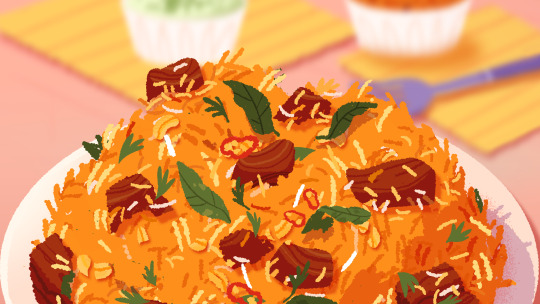
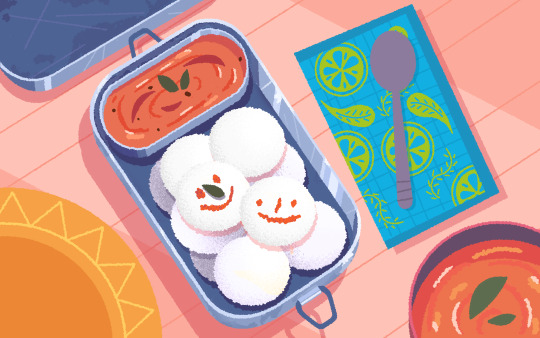

If you're looking for more narrative indie games by Asian devs and exploring Asian diaspora experiences check out Venba!
Venba is a narrative cooking game where you play as an Indian mom who immigrates to Canada with her family in the 1980s. Players will cook various dishes and restore lost recipes, hold branching conversations and explore in this story about family, love, loss and more.
It just came out recently and is available on all major platforms, including Steam and console!
#Venba#venba game#asian diaspora#indie game#indie dev#game dev#indiedev#gamedev#indie games#video games#support indie games
703 notes
·
View notes
Text
Joy Ride brings subtle wisdom to an otherwise bawdy comedy. Audrey’s core need is for belonging and acceptance. Instead of having her find it abroad, the film directs her to look to her friends who stood up for her on the playground or buoyed her through college. The idea of a pilgrimage leading you back to the loved ones who have been there all along is also a common plotline in a girl’s- or guy’s-trip narrative. But given Joy Ride’s cultural context, it is a clever undoing of the motherland trope. Audrey’s friends are her redemption because they’re part of the same complicated diaspora and know what it’s like to struggle to belong in specific ways.
—Nina Li Coomes on how Joy Ride subverts the motherland trope
#entertainment#movies#joy ride#race in america#asian diaspora#comedy#motherland#the motherland trope#cultural identity
58 notes
·
View notes
Photo
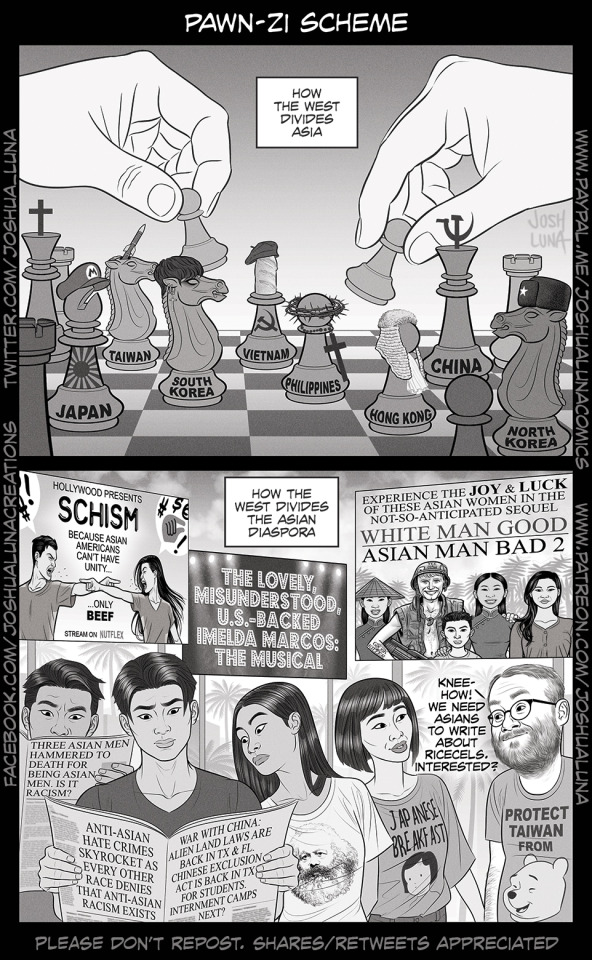
Like any other group, Asians and Asian Americans obviously have their own conflicts. But they're taught to invest in external ideologies that hurt them as a path to "progress."
(Please don’t repost or edit my art. Reblogs are always appreciated.)
If you enjoy my comics, please pledge to my Patreon or donate to my Paypal.
https://twitter.com/Joshua_Luna/status/1134522555744866304
https://patreon.com/joshualuna
https://www.paypal.com/paypalme2/JoshuaLunaComics
#Pawnzi Scheme#Pawn-zi scheme#Asia#Asians#Asian diaspora#asian americans#asian america#comic#my art#fil-am artist#aapi heritage month#apahm#aapihm#artists on tumblr#joshua luna#josh luna
70 notes
·
View notes
Text
Vagueblogging again!
I think a lot about the argument fandom racists make. It's always "fandom isn't activism," "go do some real activism," etc. etc.
Like, one -- I think quite a few of us have done "real" activism. Organizing, protesting, fundraising, information-sharing, all that good stuff. Especially in these past few years. You can't be Asian American without having at least brushed with activism lately.
Two -- telling someone that what they said hurts or disrespects your culture is not activism. That's literally just an everyday interaction. You could have learned something and accepted it, but the moment you dismissed it and dug your heels in, then yeah, you're making it a way bigger deal than it has to be.
Three -- Asian Americans have always organized, protested, and advocated for better rights on all fronts. The bill in Florida recently passed is part of a years-long effort to make Asian American history part of school curricula (its effects are for another post entirely), Asian Americans in various organizations have been tirelessly doing research, petitioning and lobbying for better healthcare and economic aid access. The burst of Asian American shows like "Beef" and "Everything Everywhere All At Once" are part of a DECADES-long push to have our stories told in ways that aren't stereotypical and degrading. Not to mention to make sure we get equal pay in the workplace.
People have always committed hate crimes against us, but because of COVID, it jumped to a point where there was actual media coverage outside of the community. It got so big, no one could ignore us anymore. It was good to get aid from outside the community, but even now, the people organizing self-defense classes, patrolling Asian dominant neighborhoods and walking with elders so they can go places without being attacked, the people organizing food drives for those of us who are lower-income, raising money for the victims of hate crimes, fighting for us in our court cases against attackers, pushing for our voices to be heard, are us Asian Americans.
It's a lot of work. It's also a lot of work to rally people to our cause, because so many people outside the community, especially white people, will not listen, let alone help in any meaningful way, unless you convince them why they personally should care. To be BIPOC at all in North America is to do the emotional labor that white people think you owe them.
So tell me. If true activism is so important to you, why aren't you doing it?
And you know how I know you aren't doing it? Because if you can't be bothered to listen to an Asian person in small, casual, everyday interactions, what makes you think you're equipped to help us advocate for large social change?
#again#people can slide into my dms if they wanna talk about certain things in detail issokay#i always have a million resources and orgs if you guys need pointers on activism and getting involved#but i generally keep this account for funsies and shitposting#and like this is asian america specific because i'm not gonna speak for other places#i can always point you towards asian diaspora elsewhere who ARE speaking out though#microaggressions#fandom racism#asian american#hate crime mention#asian america#asian diaspora#anti asian racism#anti asian hate#racism in fandom#tears falling like peridots#like if these last three years aren't gonna teach you that we're humans who need a listening ear#nothing will
17 notes
·
View notes
Photo

Opening October 14… Oscar yi Hou: East of sun, west of moon.
Named for the artist’s consideration of the in-betweenness of Asian American identity, this exhibition is a timely, focused feature of eleven recent paintings that primarily highlight queer, Asian diasporic subjects and illuminate the intersectional identities of the artist and his friends.
We are very excited to host yi Hou’s first solo museum exhibition as the winner of the third UOVO Prize, which cites East Asian visual culture and U.S. popular culture to encourage us to question who is considered “American” at this time of social unrest and political polarization.
Learn more about this upcoming exhibition, which will be on view through September 17, 2023. The UOVO Prize is made possible by UOVO.
🔗 https://bit.ly/OscaryiHouBkM
🎨 Oscar yi Hou (born Liverpool, UK, 1998). Coolieisms, aka: Sly Son Goku turns 23, 2021. Oil on canvas, 30 × 24 in. (76.2 × 61 cm). Courtesy of James Fuentes LLC. © Oscar yi Hou. (Photo: Jason Mandella, courtesy of James Fuentes LLC)
#Brooklyn Museum#brooklyn#museum#art#exhibition#Oscar yi Hou#OscaryiHouBkM#New York City#nyc#asian diaspora#queer#identity#representation
34 notes
·
View notes
Text
Brain Dump on Permission to Come Home
There’s a chapter titled Permission to Take up Space. That one really hit home. It really forced me to think about this topic that I never really thought too much about before. How, in general, Asians and particularly Asian women, we have this avoidance to take up space. I think part of it comes from the fact that in many Asian cultures, being humble, keeping your head down, going with the flow, not making a ruckus, has been a survival tactic for a lot of immigrant parents. And just culturally, being humble, keeping your head down and working hard, is praised! Add on the fact that Asian women we're praised when we are obedient, when we're docile, agreeable and easygoing. We were criticized as girls, scolded and chastised if we dared talk back or if we were not acting “appropriately” in accordance to others. It makes a lot of sense why I always struggled with taking up space. I think part of it also comes from a place of fear that if I take up too much space, I am going to upset somebody and they're not going to like me anymore. This contributes to me always trying to be super accommodating and having a lot of anxiety when I feel like I’ve failed at that.
Growing up, I was always encouraged by my Chinese family to not take up space. Ironically, that was in direct conflict with the Western values I also grew up around. Because in American/western society, speaking up, taking leadership - these are things that are praised. Obviously, that changes depending on certain identities one holds, such as race, gender, class, ability etc. But for the most part, these things are cheered on I guess. My feelings around this topic of taking up space are complicated. On one hand, I can recognize and acknowledge and be thankful for all the ways not taking up space has protected me. Like I mentioned, it's good for survival. It’s helped me to survive in this crazy, crazy world. Especially in dynamics or settings where there is an imbalance in power, where I'm in a position of less power. Also, there are times when I actually feel good about not taking up space. Especially when that means I am allowing someone else to have that space. Someone who has historically been marginalized and not allowed to take up space. Those are times when I genuinely do enjoy stepping back and taking up less space, so that someone else who I feel deserves it can take up that space, if that makes any sense.
At the same time, I do have to acknowledge that my avoidance of taking up space has detriments in the sense of where because I've become so unaccustomed to taking up space, the act of taking up space becomes so, so difficult for me. It causes me so much anxiety, so much fear, so many difficult emotions. It's made it so that it's so hard for me to take up space now because it just feels so unnatural. And that's a detriment when it comes to relationships, friendships, and professional life. People can sense that and take advantage. And because I don’t take up space, because I don’t speak up, I just let things sit and stew inside me, which...just leads to a lot of passive aggressiveness.
#mental health#permission to come home#jenny wang#asian diaspora#asian mental health#oc#chinese#asian american#chinese american#mental health awareness
4 notes
·
View notes
Text
This is a really fascinating article about how western translators and Vietnamese diaspora authors sometimes unwittingly fetishize the Vietnamese language due to their lack of education and exposure to it in contexts beyond their scope of knowledge and experience. It also speaks to a larger phenomenon of Asian languages being perceived as exotic by both non-Asians and the Asian diaspora in the west.
This article reminds me of a conversation I once had with a Chinese friend who said something along the lines of: “Chinese is a more poetic and subtle language, while English is more precise, structured, explicit.”
I was initially very confused because I’ve read a lot of poetic English prose and a lot of technical instruction manuals in Chinese.
And then I realized the problem: because Chinese is his native language, he is able to express himself more poetically and subtly should he chose to do so. Because he isn’t quite fluent in English, he tends to express himself in a precise and straightforward manner to efficiently get his point across, structuring his sentences as he’d been taught in his English-as-a-second-language classes.
Some people have a tendency to conflate the limits of their linguistic abilities in a language with the limits of the language itself. There are certainly untranslatable words and phrases, and no translation from one language to another can faithfully replicate the layers of meaning, sound, and nuance of the original. Every translation is an interpretation. But sometimes, translation eludes us because we suck at the language, and it’s okay to admit that! It’s ok to admit that we may sometimes have a naive approach to the language because of our limited exposure to it!
I have heard variations of the sentiment Ocean Vuong expresses in this interview with the New York Times, for example, from quite a few of my second-generation Chinese-American friends too:
“Cause in the Vietnamese context—and it might be similar to Chinese—words are like spells. If you talk about death, death visits you, so you don’t talk about death at the dinner table. There’s a lot of taboo around speech and how it brings forth the darkness. […] Chinese and Vietnamese culture is so much older than America. And I think, in this sense, America is still immature. I would argue that the way it renders and handles language is still quite primitive for a nation and a culture that has so much technological prowess. It’s actually quite archaic in how it imagines the capacity of language, and, and in this sense, Chinese and Vietnamese culture are way ahead, both in the time line, but also culturally, in their wisdom.”
For many of my second generation Chinese-American friends, Chinese is an elusive, and sometimes mysterious language seemingly full of ancient wisdom. It remains a “magical” language for them, probably because for them, it is not the language of legal disclosures, celebrity gossip, and dry philosophy texts in translation.
I had shared some of that belief in the “ancient wisdom” of Chinese too, until I started understanding the bawdy sexual innuendos in Tang Dynasty Chinese poetry, until I came across a sub-genre of Song Dynasty poems about cats (one poet wrote a series of poems about his white cat named “Snow”, who was apparently very fluffy and warm to cuddle with under the blankets in winter 😻), until I came across trashy Ming dynasty romances (mass produced and marketed towards bored & cloistered women).
As for cultural taboos around using violent metaphors, I don’t know anything about Vietnamese, but contemporary Chinese slang seems to have less regard for these old taboos. 我要死了 “I am dead” is often used on the internet to express an intense fannish emotional reaction to something. X会杀了我的 “X is going to kill me (if I did Y)” means exactly what it says on the tin. And finally, “开抢” in the sichuanese Chinese dialect means “to shoot with a gun” but actually means “to say something”. To begin a conversation in Sichuanese is to shoot at each other. How lovely.
Sometimes the curtain is just blue, and a cigar is just a cigar.
10 notes
·
View notes
Text
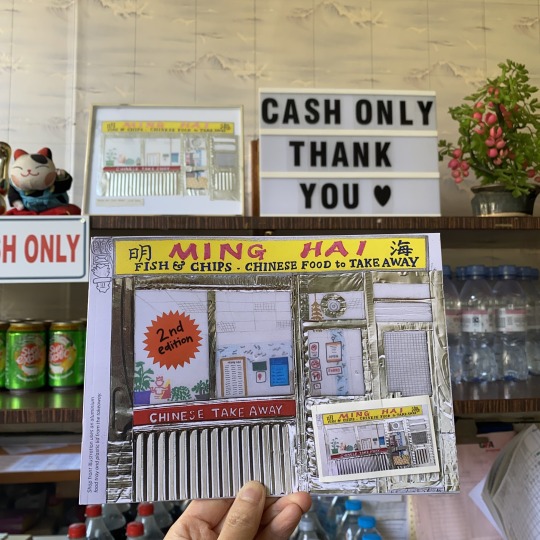

明 Ming Hai 海 Zine - design, research, text & illustration
Ming Hai is a 34 year old Chinese takeaway in Hackney, London UK, run by the Chan family. All the family members contributed stories or illustrations and photos from the archives about what it is like to live and work in a Chinese takeaway, whether as an immigrant or a second-generation takeaway kid. This zine is a love letter to the takeaway and to takeaway kids worldwide.
After the amazing response to the first edition and running low on zines, I decided to do a second edition but instead of a straight reprint, this edition comes with additional content and a sticker.
An independent published zine by kamipaper.
• A5 Landscape
• English and a tiny bit of Cantonese
• 24 pages full colour
• 200-250gsm recycled card cover
• 100gsm recycled paper
• Shop front sticker
Special thanks to:
- Lauren Siobhan
- Vivien Chan
- Rio Cinema Archives
- Isola Press
- Alan Denney
Available at:
• Migration Museum - Lewisham, London UK
• Museum of the Home - Hoxton, London UK
• Housmans Bookshop - Kings Cross, London UK
• Burley Fisher Books - Haggerston, London UK
• Books - Peckham, London UK
• Migration Museum - Lewisham, London UK
• Hackney Chinese Community Services - Hackney, London UK
• The Steamroom - Haggerston, London UK
• Pushkin House - Bloomsbury, London UK
• South London Gallery - Peckham, London UK
• Ming Hai Takeaway - Hackney, London UK
• Newbridge Projects - Newcastle upon Tyne, UK
• Wing On Wo & Co - New York, USA
• kamipaper Etsy Shop - Worldwide
May 2023
#明 Ming Hai 海#明海#ming hai#ming hai takeaway#chinese takeaway kid#chinese takeaway#takeaway kid#second generation#immigrant entrepreneur#hackney history#asian diaspora#diy zine#zine#self publishing#esea creative#east london#ming hai zine#kamipaper
4 notes
·
View notes
Photo
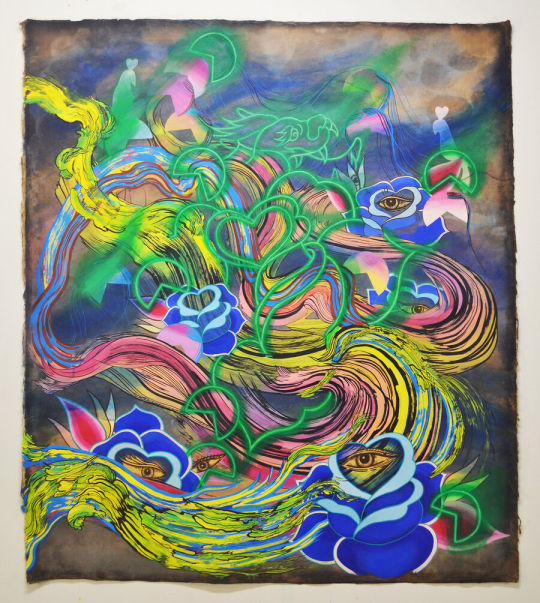
How Artists of the Asian Diaspora Are Drawing on Traditions from Their Heritage
Across various mediums, contemporary artists from the Asian and Pacific Islander diaspora draw on traditional art techniques. From Kashmiri embroidery to Native Hawaiian kapa to Indigenous Filipino banig weaving, new generations are not only embracing and preserving these legacies, but also expanding the artistic possibilities of these methods.
While today, these cultural practices are frequently celebrated, for some, it has been a protracted struggle to have their traditions recognized as legitimate.
For Artsy, I highlight five artists whose practices are influenced by traditional techniques.
Image: Jiha Moon, Yellowave (Nocturnal), 2022, Mindy Solomon Gallery
#my writing#art#asian diaspora#asian american#asian pacific american heritage month#apahm#aapi month#shahzia sikander#jiha moon#jagdeep raina#nanea lum#bhen alan
4 notes
·
View notes
Text
As chinese indonesian, reading the dear readers part of dial a for aunties literally made me fucking tear up 🥲
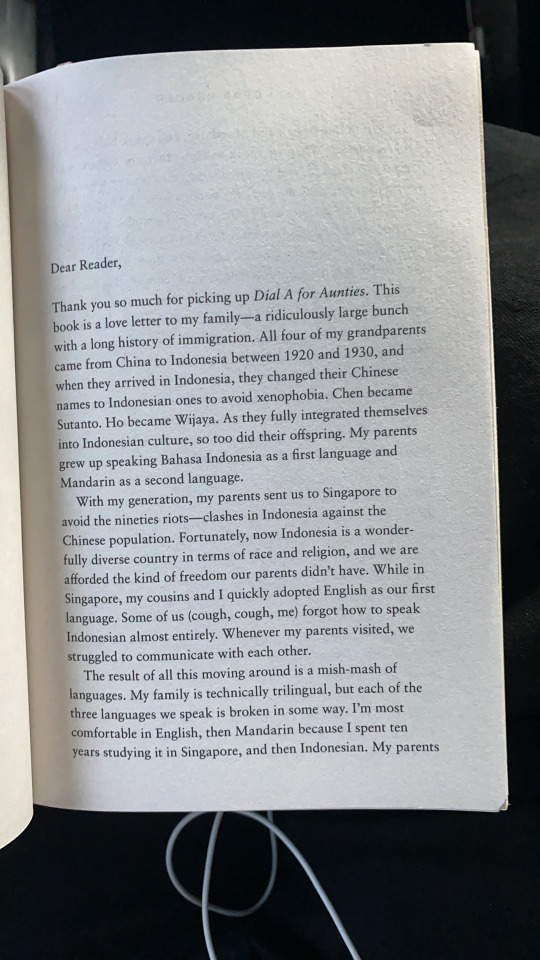
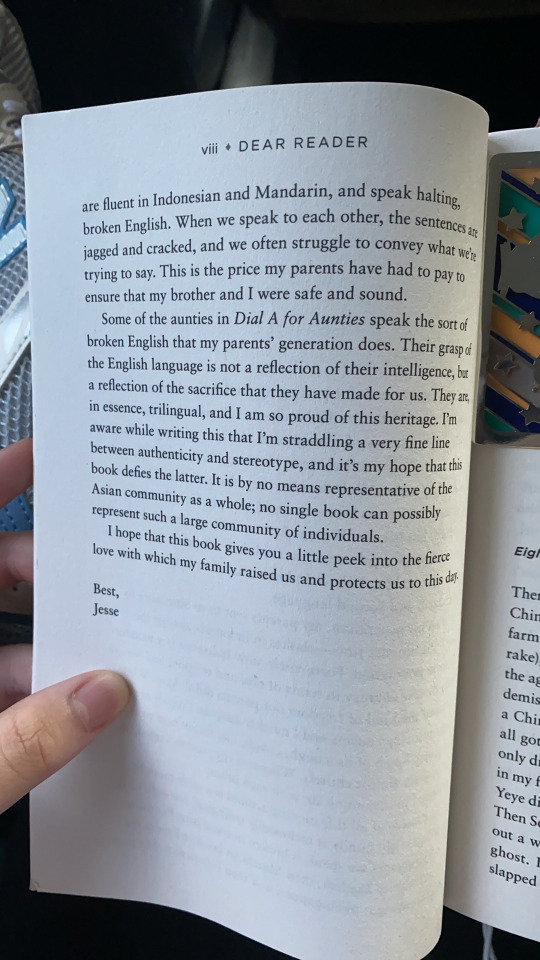
Like what the fuck, why is this kinda relatable even though I wasn’t even born in the 90s *sobbing 🙃
#jesse q sutanto#dial a for aunties#dafd#books#Chinese Indonesia#indonesian#chinese#asian diaspora#immigration#sobbing#random thoughts#finally starting a book
7 notes
·
View notes
Text
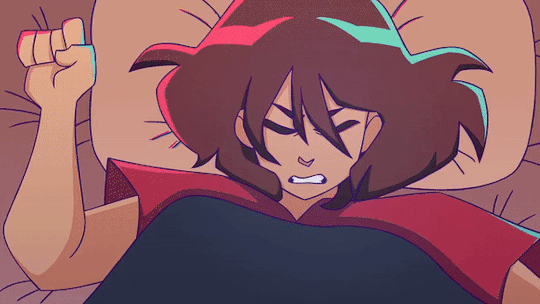




The Real World & the Spirit World
#2d animation#animation#indie game#game dev#indie dev#magical girl#asian diaspora#asian culture#aapi#animated trailer#indie games#gamedev#indiedev#video games#gaming#midautumn#midautumn game#gif#gif set
162 notes
·
View notes
Text
EEAAO won 7 Oscars out of 11 nominations. My birthday is 11/7. My cousin's birthday is 7/11. We are also Asian. So are WE everything...everywhere??? all...at...once?!
5 notes
·
View notes
Text
I don't think my boss knows I don't speak Mandarin. I mean I told him explicitly more than once that I don't but every once in a while he will forward me an email in Chinese and tell me to deal with it. So I pull up google translate and handle whatever it is. But I really feel like even if I had spoken Mandarin at home with my parents and gone to Chinese school I still wouldn't know how to say "laparoscopic gallbladder removal" in Chinese so I don't know what he's expecting here.
4 notes
·
View notes
Text
I'm glad I skipped the whole kids-making-fun-of-your-lunch thing Asian kids in white suburbia go through, because I'm always the person shamelessly eating a heap of Asian food in the middle of an office. In college someone complained about my kimchi and rice and I told him to fuck off. I just had kimchi and naengmyeon yesterday. I eat Taiwanese braised pork and people stop and stare because they wonder where I got it. My Irish colleague just stopped and stared at my chicken bun like he'd just spotted the Holy Grail.
#not me slurping my soy milk while everyone else drinks coffee#tears falling like peridots#asian diaspora#come to think of it#I'm usually the only person eating “ethnic” food in the office
8 notes
·
View notes
Photo
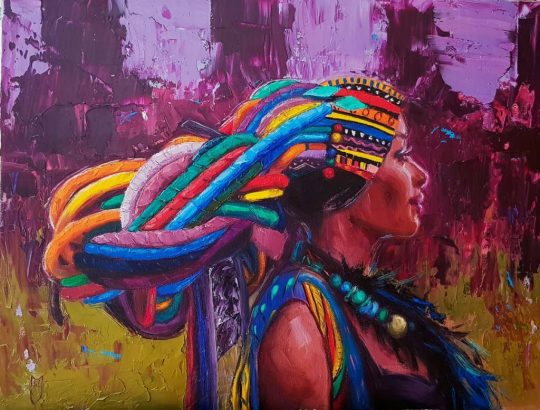
Pretty Mas, 2020
Marissa Yung Lee
Oil on Canvas
#art#Marissa Yung Lee#Pretty Mas#2020#2020s#oil on canvas#Trinidadian artist#Trinidad and Tobago#Trinidadian Korean#Asian Trinidadian#Trini Korean#Caribbean Artist#Asian Diaspora#Korean Diaspora#oil painting#West Indian#mas
4 notes
·
View notes
Text
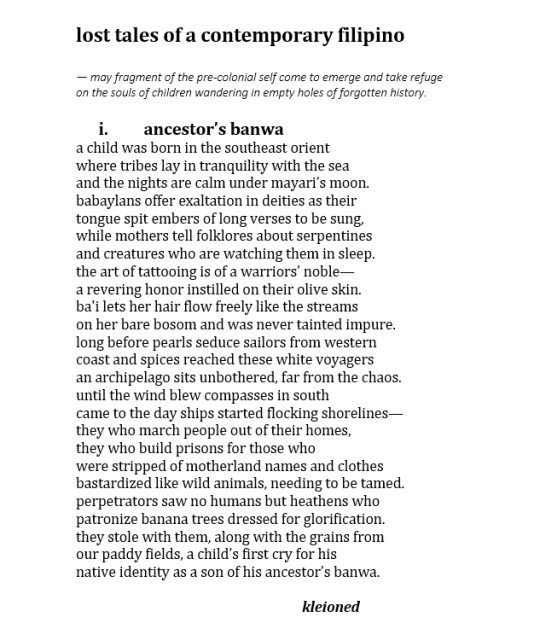
wrote this poem four years ago as part of a sequence i never got to finish.
5 notes
·
View notes